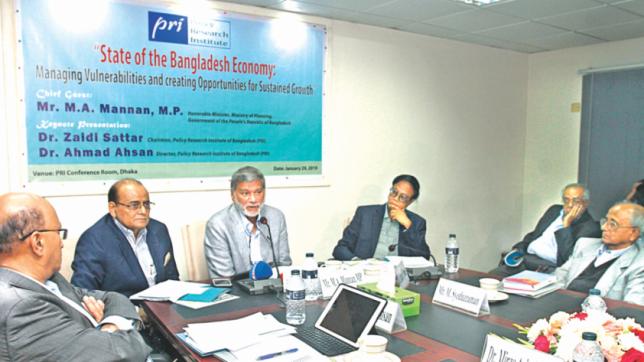High NPLs to slow growth

High non-performing loans (NPLs) are threatening the growth and stability of the economy, the Policy Research Institute of Bangladesh said yesterday, calling for stemming loan concentration to large borrowers and cutting the number of state banks.
The think tank said NPLs and classified loans have increased significantly, especially in the state banks, with the top 20 borrowers holding a third of the default loans.
"Banks and borrowers have created this situation and large borrowers have held the banking sector hostage," said PRI Chairman Zaidi Sattar in a presentation on “State of Bangladesh Economy 2018: Managing Vulnerabilities and Creating Opportunities to Sustain Growth” at his office in Dhaka.
The PRI said the recent economic growth of Bangladesh has helped the country to be one of the top 10 fastest growing nations in the world.
“The economy is geared for growth. But sustaining and accelerating growth will be the challenge. Growing vulnerabilities will need to be addressed,” said Sattar.
He cited uncertainties in the global economy, weak revenue collection, modest growth in private investment and foreign investment flows, slowdown in jobs growth, excessive dependence of the economy on the garments sector and the rising NPL as the future challenges for the economy.
Sattar suggested stopping loan concentration to large borrowers to prevent NPL accumulation. The PRI, using Bangladesh Bank data, said state-run banks have the highest level of NPLs. Gross NPLs at the state-run commercial banks (SCBs) rose 28.24 percent as of June 2018 from 26.8 percent a year ago.
Sattar said Bangladesh does not need so many SCBs. “Turn the state-owned banks into deposit banks, except one or two and stop lending by them for the time being,” he said, adding that a couple of SCBs are needed for the treasury functions of the government.
The PRI said there are uncertain balance-sheet risks at several state-owned and private commercial banks. Recent changes in the tenure and family membership of bank boards have weakened oversight, it added.
"The banking sector is not just about money as there is the issue about confidence," said PRI Director Ahmad Ahsan, calling for reforms in the banking sector.
Ghulam Rahman, president of the Consumers Association of Bangladesh, said depositors are deprived of fair interests on their deposits owing to the high NPLs.
He said realisation of Tk 75,000 crore has been stuck for cases in courts. Reforms laws and expediting trials are needed. AB Mirza Azizul Islam, a former finance adviser to a caretaker government, said there is no competition in the banking sector regarding interest rate fixing.
There is collusive oligopoly in the case of fixing interest rates and this creates the scope for mis-governance, he said. Planning Minister MA Mannan said Bangladesh has done well, but there are some gaps.
On NPLs, he said there has been a suggestion to set up a banking commission to carry out monitoring and some supervisory works over loan operations. “But Bangladesh Bank is doing the work. If it fails, then we can look at it,” he said.
The PRI recommended reforms in the tax administration to increase domestic revenue collection.
"Reforms are needed and the status quo is not an option," said PRI Executive Director Ahsan H Mansur.
The think tank called for revamping the trade policy for exports and giving priority to education, labour skill, urban and infrastructure development.
